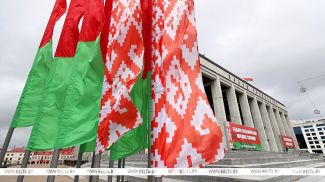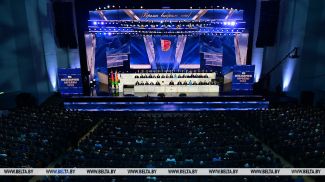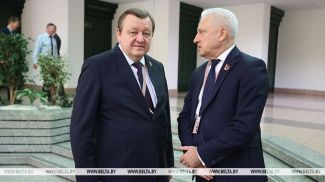MINSK, 13 April (BelTA) – Amendments to the law on mass events passed the first reading in the House of Representatives on 2 April. The SB. Belarus Segodnya newspaper hosted experts to discuss the reasons for amending the law, BelTA has learned.
Public life and legislative activities have changed in many ways since the law on mass events was adopted in 1997, said Viktor Nikolaikin, Chairman of the Standing Commission on Housing Policy and Construction of the House of Representatives. MPs regularly amended the law, but the events in Belarus late last year (and indeed in the world) necessitated revisiting and revising this document from the point of view of law enforcement practice.
“We studied the experience of European and Asian countries, Russia, the United States of America which saw various demonstrations and protests. By the way, the Russians were even prompter in terms of law-making in this area. We believed that it was enough to update the law regularly. Unfortunately, there were some loopholes, ambiguous interpretation of certain words, sentences, individual paragraphs or articles. For example, some pseudo-lawyers did not consider the word "not entitled" as prohibitive. Some used the status of a journalist or citizenship of another country as a front to be able to violate the law. They used these loopholes to evade responsibility,” the MP said “But since the state guarantees rights and freedoms and sets the rules of the game by law, it bears responsibility for ensuring public safety, protecting the rights and freedoms of other citizens to make sure that people who have nothing to do with an event but may be involved in it voluntarily or unwittingly are not harmed."
Political analyst Aleksandr Shpakovsky, for his part, stressed that in 2019 the Belarusian legislation on mass events was eased to allow holding mass events practically on an application principle.
“But even these, very liberal rules caused discontent with the ‘opposition' who apparently wanted the state to pay for protests from the national budget. The events of August-November 2020 demonstrated that even such soft legislation was blatantly and brazenly violated. People were encouraged to participate in unauthorized events, to take to the streets, to block streets and avenues. In fact, the Sunday protests paralyzed the life of the Belarusian capital and did not allow law-abiding citizens to fully enjoy their days off. In this regard, the decision was taken to tighten the legislation. Strict regulation of public events also makes sense because certain political forces do not want a dialogue and oppose civilized forms of public events that would not affect citizens holding different views and the state in general,” said the expert.
According to him, Belarus is not reinventing the wheel here, it is not the country's know-how. “The whole world is experiencing a wave of protests against COVID-related lockdown, quarantine restrictions and bans on freedom of movement. Accordingly, the legislation on mass events is tightened in various countries, in the European Union and countries in other regions. In Southeast Asia this is the threat of color revolutions in the first place. I am talking about the situation in Hong Kong, Myanmar and so on. Lawmakers respond by increasing responsibility for an unauthorized event and for the organization of mass unrest,” said Aleksandr Shpakovsky.
International experience was studied when amending the law on mass events, said Dmitry Kuryan, deputy head of the Directorate for Law Enforcement and Crime Prevention at the Public Security Police of the Ministry of Internal Affairs. “During the work on the bill we studied the innovations of the Russian legislation, normative legal acts of foreign countries, and academic papers on the relevant legislation. For example, Russia adopted some of our provisions of the law on mass events (designation of journalists during mass events). We have also taken into account some of their approaches (the status of the journalist),” said the representative of the Ministry of Interior Affairs.











